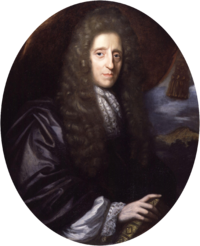John Locke
John Locke (pípè /ˈlɒk/; 29 Osu Kejo 1632 – 28 Osu Kewa 1704), to gbajumo gege bi Baba Isealainide,[2][3][4] je amoye ati onisegun ara Ilegeesi to je ikan larin awon onironu Olaju to ni ipa julo. Won gba bi ikan lara awon aseoniriri akoko ara Britani, nipa titele asa ti Francis Bacon bere, bakanna o tun se pataki si ero adehun awujo. Ise re se pataki fun idagbasoke epistemology ati imoye oselu. Awon iwe re ni ipa lori Voltaire ati Rousseau, opo awon onironu Olaju Skotlandi, ati bakanna lori awon Olujidide Amerika. Ipa re si iseolominira ijohun ati ero alainide han ninu Ifilole Ilominira Amerika .[5]

|
Àyọkà yìí tàbí apá rẹ̀ únfẹ́ àtúnṣe sí. Ẹ le fẹ̀ jù báyìí lọ tàbí kí ẹ ṣàtúnṣe rẹ̀ lọ́nà tí yíò mu kúnrẹ́rẹ́. Ẹ ran Wikipedia lọ́wọ́ láti fẹ̀ẹ́ jù báyìí lọ. |
Itokasi
- ↑ Peter Laslett (1988). "Introduction: Locke and Hobbes". Two Treatises on Government. Cambridge University Press. p. 68. ISBN 9780521357302.
- ↑ Locke, John. A Letter Concerning Toleration Routledge, New York, 1991. p. 5 (Introduction)
- ↑ Delaney, Tim. The march of unreason: science, democracy, and the new fundamentalism Oxford University Press, New York, 2005. p. 18
- ↑ Godwin, Kenneth et al. School choice tradeoffs: liberty, equity, and diversity University of Texas Press, Austin, 2002. p. 12
- ↑ Becker, Carl Lotus. The Declaration of Independence: A Study in the History of Political Ideas Harcourt, Brace, 1922. p. 27

